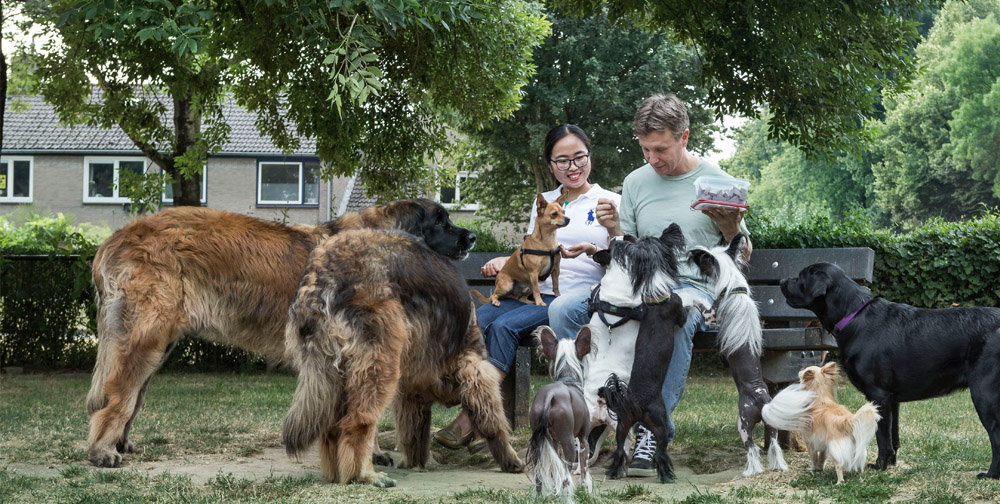Does my turtle look disappointed?
If a labradoodle could speak, we would – to paraphrase Wittgenstein – not be able to understand it. What gives our words meaning is a shared way of life, a way of making sense of the world. And yet, most people think their pets understand them or, at the very least, that their feelings are analogous to ours. To contribute to sustainable human–animal relationships, Bingtao Su, under the supervision of Pim Martens, researched the relationship between the ethical outlook of pet owners, their sense of attachment to their animal companions and their attribution of emotions to them.
For her PhD, Su analysed data from two questionnaires with more than 4,000 respondents from the Netherlands, China and Japan. She sought to answer three questions: How do participants’ ethical ideologies relate to their attitudes towards animals in general? Is there a correlation between how attached owners are to their pets and their attribution of emotion to the animals in question? And what is the environmental impact of companion animals?
Improving attitudes
“Eastern countries are more collectivistic, so they tend to perceive animal welfare through the prism of a cost–benefit analysis,” Su explains. “Accordingly, they tend to be more tolerant towards things like medical experiments on animals. In Western countries, animal suffering is seen as an absolute evil.” Attitudes towards animals had already been studied in Western countries, but not in Eastern countries like China or Japan. “I thought it would be interesting and honestly, I think it would be good to improve Chinese and Japanese people’s attitudes towards animals.”
On the question of sustainable development, Su explored the environmental impact of companion animals’ food consumption, their so-called ‘ecological paw print’. It may sound adorable, but the facts are troubling: owning a large dog could increase your ecological footprint by almost 60% and your greenhouse gas emissions by more than 10%. The environmental impact of a large dog’s diet equals that of ten adults.
Su, who has a background in sociology as well as three turtles, has enjoyed her time in Maastricht. “The Dutch are very open and appreciate individual rights and freedom.” She picked Maastricht for her supervisor Pim Martens: “I already knew about him from his papers on sustainable development. I contacted him, we exchanged ideas, and I applied to the Chinese Scholarship Council.” She was successful, and in the course of her PhD Su published seven peer-reviewed papers. “Working together was a great experience. Pim is always approachable and very encouraging and reassuring.”
- Text continues below the picture -

Turtle-steps towards greater awareness
Almost all pet owners in the study attributed primary emotions like anger, joy or fear to their cats and dogs. Secondary or more complex emotions, such as jealousy or shame, also came up in varying degrees. Interestingly, more than 70% percent of respondents in the Eastern countries attributed compassion to their pets, versus 28% in the Netherlands. “Compassion plays a pivotal role in many Eastern cultures; people might therefore be more aware of it and more likely to interpret their animals’ behaviour in that way.”
The philosopher Jeremy Bentham would have said of Wittgenstein’s pooch that it doesn’t matter whether he can reason or talk, only that he can suffer. And, slowly and steadily like a turtle, we should translate into action the realisation that animals – even the ones we don’t cuddle regularly – can suffer, and that how we treat them reflects on us.
Bingtao Su (31) has a PhD in Sustainability Science with a focus on sustainable human–animal relationships. The title of her thesis is ‘Human–animal relationships: A cross-cultural comparison of human attitudes towards animals’. Prior to coming to Maastricht, she studied sociology at Northwest A&F University, China.
Pim Martens (AGE) is professor of Sustainable Development at UM and extraordinary professor at Stellenbosch University. He has conducted research at ETH Zurich, Heidelberg University, Harvard University, the London School of Hygiene and Tropical Medicine and elsewhere. He is the founder of AnimalWise, a “think and do tank” working towards a better relationship with animals
Also read
-

-
Three Vidi grants for FHML researchers
Aurélie Carlier, Bart Spronck and Nicole Leibold receive a Vidi grant of up to 850,000 euros to further develop their lines of research.

-
We Can Work It Out – A study into an improved interpretation of current EU law to address VAT double (non )taxation caused by divergent national decisions
PhD thesis by Mathijs Klemm
